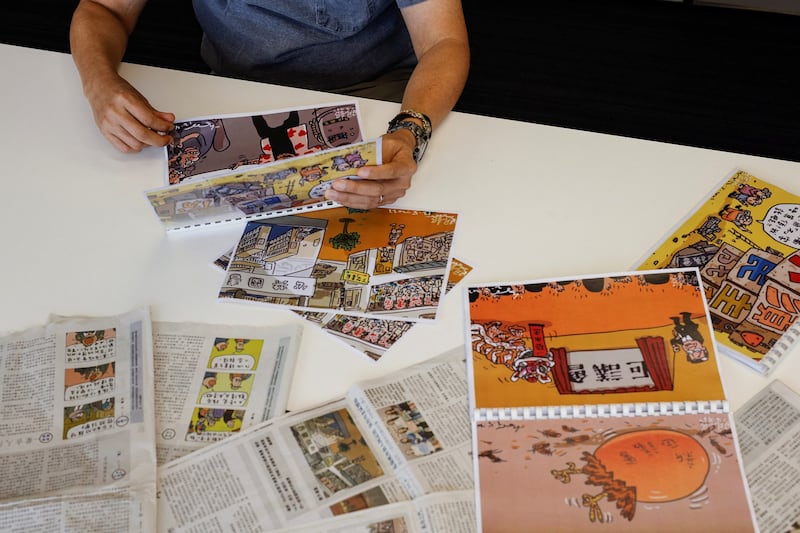The axing of a satirical political cartoon by a major Hong Kong newspaper was due to “political pressure” from government officials, cartoonist Zunzi told Radio Free Asia in a recent interview.
Hong Kong's Chinese-language newspaper of record, the Ming Pao, last week canceled Zunzi's regular comic strip following an onslaught of public criticism from government officials.
Staff at the paper expressed "regret and a sense of helplessness" over the move.
Cartoonist Huang Jijun, 68, who had cartoons in every edition of the now-shuttered pro-democracy Apple Daily newspaper for 26 years, told RFA Mandarin that the canceling of his column reflects the overall political climate in Hong Kong, where civil rights have been drastically rolled back under the 2020 national security law.
"Of course it was due to political pressure," he said. "It wasn't that my fee was so low that I couldn't keep doing the cartoons."
"It's clearly linked to the political situation: they wanted [the Ming Pao] to stop publishing my column," Huang told Radio Free Asia, after earlier declining to comment on the reasons for the move.
"The government sent a warning message to the newspaper, allowing them to deal with it flexibly," he said. "In times of tight [political] controls, when the accusations are flying around ... everything is under the microscope … anyone can be accused of a crime."
Books of Huang's political cartoons were also recently removed from public libraries in the city.
"They think these books will have a negative impact on society," he said. "They don't want the public to be influenced by them, otherwise they wouldn't be doing this. Every move they make is with one eye on its public impact."
Censorship growing
Huang said the national security law, imposed on the city by the ruling Chinese Communist Party in 2020 to clamp down on public dissent in the wake of the 2019 protest movement, makes it harder to predict just how far the authorities are willing to go with public censorship.
"It's hard to tell whether the current situation will lead to an even tighter crackdown by the authorities," he said.
Hong Kong is in the throes of a political censorship campaign targeting all forms of public expression, Huang said.
"This isn't about there being a problem with cartoons; the problem comes from the satire [they depict]," he said. "They want to keep to a minimum anything that is funny, or pokes fun at something."
"It's very hard for those in power to tolerate any kind of satire."

Huang, who has previously published a compendium of cartoons marking the anniversary of the June 4, 1989, Tiananmen massacre, said he is unlikely to be producing any new work to mark this year's anniversary.
"Naturally, we used to do our best to mark the June 4 massacre before, but the risks are much higher now," he said. "Actually, my not producing a cartoon [for the anniversary] is a pretty good reflection of the way things are."
"If someone who used to produce a cartoon every year, like the [ now-banned] candlelight vigil in Victoria Park where people used to go every year, suddenly stops, the world will pay attention," Huang said.
"Once the cartoons stop, you can count how many years it has been since the last cartoon about June 4," he said. "Time left blank leaves a clear historical record."
No plans to leave
But Huang said he still has no plans to leave Hong Kong, despite an ongoing exodus of middle-class professionals and wealthy families alike.
"I will stay in Hong Kong. Hong Kong has been through dark times before, and people back then would have said they were the darkest of times," he said. "I don't necessarily think that Hong Kong today is living through the darkest times."
"People should try to go in the direction of the light ... and work together to make it not quite so dark," Huang said, citing his first political cartoon that riffed on political and social uncertainty in Hong Kong amid ongoing negotiations between Britain and China over the city's future.
When asked to reflect on the last four decades of his political cartoons, Huang likened Hong Kong to a paper kite tossed about in the wind, not knowing where it is headed, and with no say in the matter.
Translated by Luisetta Mudie. Edited by Malcolm Foster.

